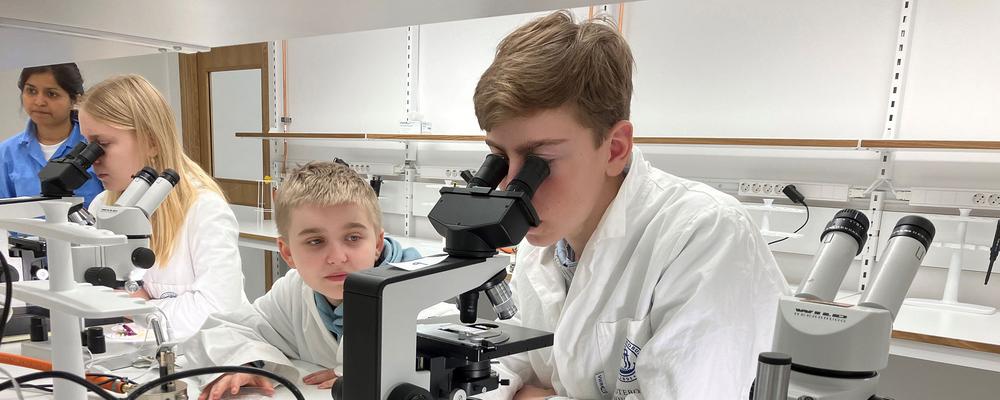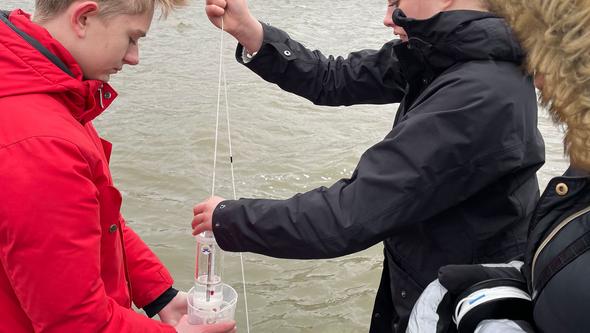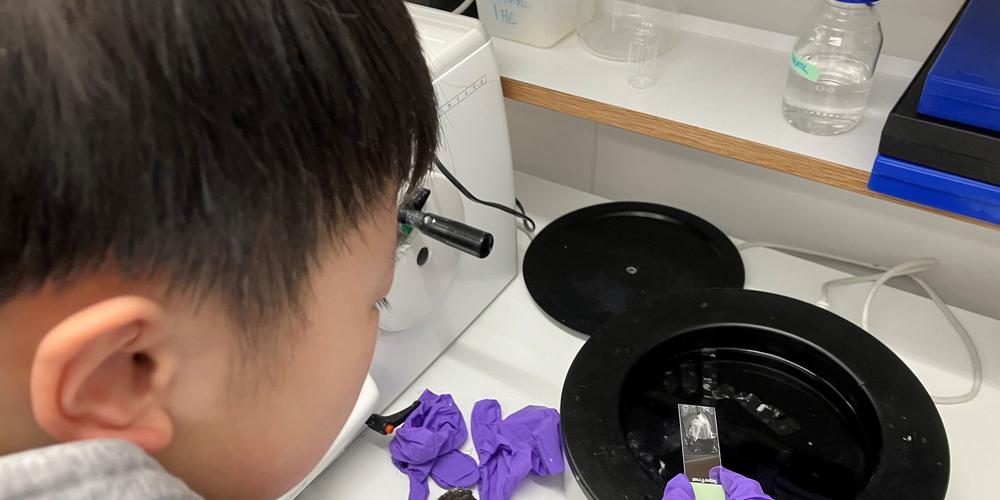
- Home
- Research
- Find research
- Curious pupils learn about life as a researcher
Curious pupils learn about life as a researcher
They have examined microscopic structures, tested the salinity of the Göta River, looked at tree rings and much more besides. A group of twenty grade 8 pupils have spent a busy week experiencing what it’s like to be a scientist.
THE WIND IS BLOWING at 19 metres per second, and the waves are crashing against the floating jetty in Gothenburg’s Frihamnen. With cold hands, the pupils fish out the water meter to read the temperature of the river. Five degrees. The air isn’t much warmer, even though it’s mid-April. Marine biologists Maria Bodin and Marie Jensen are standing on the jetty – or, rather, on the blue community garden Flytevi – and instructing the students. One pupil asks to borrow Marie’s mittens. Another one asks for help writing down the results of the measurements, as his hands are too cold.
“If you can cope with this, you can cope with being a marine biologist,” jokes Marie.

MEANWHILE, THE REST of the group are sitting in a slightly warmer shipping container just a stone’s throw away, discussing the question “What stops young people from eating food from the sea?” with Susan Gotensparre, who works at Swemarc, the Swedish Mariculture Research Center. “It’s too expensive,” say some. Or: “People don’t like change.” “It sounds grosser than it actually is,” is another suggestion. It’s the third day, and the group seems to be in good spirits, despite the harsh weather.
Jack Wahlqvist, Viktor Patriksson and Alexander Sjöstedt say that they applied for the work experience week because trying out so many different things and seeing how a university works sounded like fun. Three days into the week they are enjoying themselves, and they found the previous day’s visit to the Department of Physics the most interesting so far.
“It was about AI, lasers and so on,” says Alexander.
When the groups switch places, the second group tries to find solutions to the problems discussed by the first group – that fish is expensive, it is not perceived as tasting good, and young people are conservative in their food choices. Max Rosenberg, Alexandar Cekic and Alinde Hillbratt think they can solve the latter by serving food from the sea in the form of something they actually like:
“Burgers!”
All three of them are interested in science. They found the week informative, and are considering working with research in the future. So far, they are satisfied.

SUSAN GOTENSPARRE IS leading today’s discussion. She is also the designated project manager for the work experience week, and has been following the pupils throughout the week.
“It’s been great to hang out with these amazing young people during the week! We’ve had a busy schedule and the youngsters have taken on the various activities with great enthusiasm and curiosity. But we’ve also had a lot of fun together and a lot of laughs.”
Work experience for secondary school pupils is nothing new. Between 2011 and 2019, the faculty hosted students in grades 8 and 9 during popular work experience weeks. Then came the pandemic, and since then this particular activity has been dormant.
“It’s great that we can finally offer work experience for secondary school pupils again,” says Assistant Dean Per Åberg who has ultimate responsible for the faculty’s contact with schools. “It’s been an extremely popular activity, and one that we also know has inspired students to continue their science studies.”
Text: Camilla Persson
Photo: Susan Gotensparre, Camilla Persson
